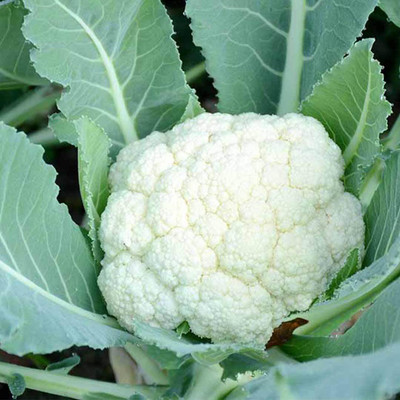SeeGreen Phool Gobi, Cauliflower _148 Seed(144 per packet)
Quick Overview
Product Price Comparison
Cauliflower seeds are the small, rounded seeds produced by the cauliflower plant, a member of the Brassica oleracea species in the mustard family (Brassicaceae). These seeds are typically light brown to dark brown and slightly oval in shape, with a smooth, hard outer coating. They are tiny, usually about 1-2 millimeters in diameter, but they hold the potential to grow into large, nutrient-rich cauliflower plants.Cauliflower seeds are typically stored in seed packets or containers, where they are kept dry and cool to maintain their viability until planting. When itŌĆÖs time to sow, these seeds are usually planted in well-drained soil, either directly in the garden or started indoors before being transplanted outside. Cauliflower prefers a cool growing season, so seeds are often sown in early spring or late summer for fall harvests.The germination process for cauliflower seeds takes about 5 to 10 days under optimal conditions, which include a soil temperature of around 70┬░F (21┬░C). After germination, the seedlings develop into sturdy plants with broad, green leaves that provide shade for the developing heads, also known as curds, which are the edible part of the cauliflower.Growing cauliflower from seeds requires regular watering, especially during dry periods, and consistent care to prevent pests and diseases such as cabbage worms, aphids, and fungal infections. The seeds should be spaced appropriately to allow the plants to mature without overcrowding, which can lead to smaller heads or poor growth.Once the plants are fully mature, typically 50 to 85 days after planting, they produce the distinctive white, creamy, or sometimes purple or green heads that are harvested for consumption. After harvesting, if the plant is allowed to continue its lifecycle, it will eventually produce flowers and seed pods, containing the seeds for the next generation of cauliflower plants.Cauliflower seeds are highly valued by gardeners and farmers alike for their ability to produce a versatile and nutritious vegetable, rich in vitamins C, K, and B6, as well as folate, fiber, and various antioxidants. Whether used in home gardens or commercial farming, cauliflower seeds represent the beginning of a plant that contributes significantly to a healthy diet and culinary diversity.


